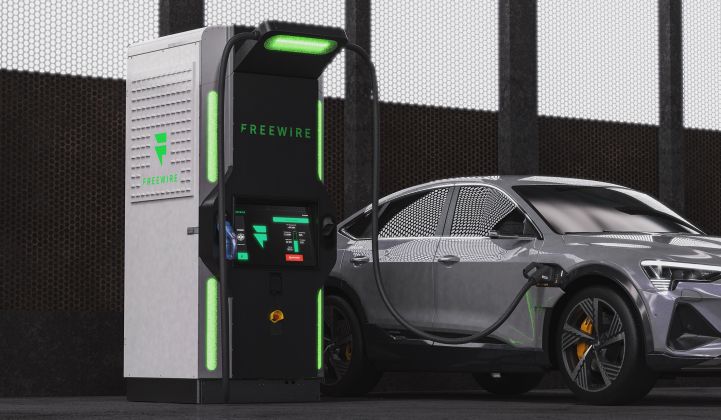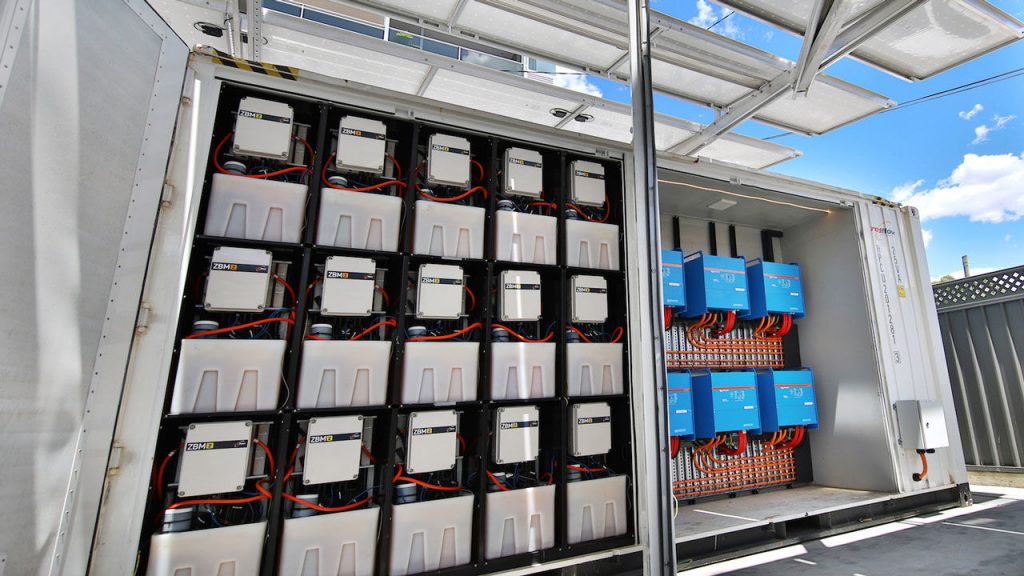To: The Impact Readers
Greetings & Salutations! 🧐
It seems like y’all love our podcasts so we are gonna keep on pushing hard forward to get you more insider content and knowledge by speaking with more and more founders and CEOs in the clean-tech space. Knowledge is power so we are going to make sure The Impact is your go to resource when learning about what is going on in the space and how to use that information to help society.
In your inbox: #decentralized EV charging; Flow batteries might have a fighting chance in the market and Shell is green-washing?

You would think with the current status of the economy we wouldn’t hear about funding being poured into what I classify as 5 years from profitability companies – but what do I know…
The two big headlines that stood out the most was Freewire – a battery integrated EV charger – raises $25M in Series A funding to bring their yet to be priced – but likely priced at ~$120K battery integrated fast charger to market. How we got that pricing for Freewire’s boost charging solution – insider info…
And SparkCharge – a portable fast EV charging station that promises to be the roadside “refueling” provider for EVs – raising a $3.3M seed round.
What this brings to attention is the ongoing capital being poured into making EV charging work around our outdated grid to keep up with demand for Electric Vehicles. Freewire is looking to build a system that can be charged via a wall outlet or a single phase connection so fast charging can be made to work anywhere. Which leads to companies like spark charge hoping to help people who couldn’t plug in have backup power wherever and whenever they need it most with their portable chargers.
This makes an interesting conversation to be had – because it seems the problem we are dealing with is the associated costs & overhead required to deploy public charging. Will utilities push for a more modernized grid or will companies like Sparkcharge and Freewire see sustainable growth as we move towards more nano-grid driven real estate assets.

For a little more than 10 years now we have been hearing the conversation of “flow batteries will beat out lithium ion batteries in the market“. Even today with the news of the merger between redT and Avalon to consolidate efforts under the name Invinity to drive flow batteries into the market it still leaves us a bit skeptical, but hopeful at the same time.
The advantages of flow batteries are clear:
While the above technical advantages are great and might save a developer or homeowner more money on storage over the long haul – since they don’t have to replace a battery every 10 years the pain point in the market isn’t there. People trust a Tesla Powerwall or an LG RESU10H far more than a new flow battery just because of “longevity”. Most people look at storage for resilience – especially since certain counties are banning natural gas and planning on limiting how long you can run a backup generator…*cough* California.
For flow batteries to really break into the market they need to find a way to address a larger pain point. People aren’t actively avoiding energy storage because of price – it’s more an issue of safety.
If flow batteries can demonstrate how they can make storage safer for people they will have a fighting chance in the market. Until then – it’s good to see companies like Invinity consolidating efforts to keep growing.

Fascinating week in oil! As you may have seen in the headlines, oil prices went negative. Specifically West Texas Intermediate (the benchmark for US crude oil) oil price went negative for two days because they’re traded as futures contracts. Production has barely changed but usage has sunk so we have way more supply than we can even really manage to store!
Could this be a wake up call for gas giants to finally bend to the loss from fossil-fuel-divested investing and commit to green energy? Shell this month announced that it aims to reduce its emissions to net-zero by 2050. Sounds fancy for an oil company to go net-zero but they’re only focusing on removing the carbon footprint from the manufacturing of its products, not the use of those products themselves. They’ll also be offsetting anything that can’t be cut entirely. All this while they’re building a $6 billion petrochemical plant in Pennsylvania (fun fact– the state has promised $1 billion in tax breaks for the project and allow them to release 2.2 million tons of carbon dioxide each year).
Back in September Nestlé also said that it would go “net zero” by 2050, even though most of its competitors have reduction goals for 2030 or even earlier.
SO – Can old dogs learn new tricks? Maybe not after all.
2050 is a nice round number that sounds nice and doesn’t seem too far away, but it doesn’t mean action now, and 30 years is a long time to forget about what a company promised (or for them to blame the old guard). It sounds like commitment, but it seems to be the new number for companies looking to green-wash instead of actually changing their practices.
Sometimes we need a little break from the news. There’s no good about the unseen enemy that leaves serious illness, death, and mass anxiety in its wake (and that just COVID-19 – we’re not even going to start on the economy).
But as some parts of the country enter week 7 under shelter-in-place orders, we thought we could all use some good news and happy thoughts. After hours-long facetimes with friends we turned to discussing the (however morbid) silver linings of COVID-19, so today we’re sharing a few of the not-so-morbid:
Less Pollution
Carbon dioxide emissions could fall by the largest amount since WWII. We could be seeing up to a 5% drop in carbon dioxide emissions this year – just in time. Decreasing emissions will mitigate some of the impacts of climate change.
Connecting More
Despite not being able to see them in person our grandparents are getting so many more calls from us than before. And our friends. And our parents. We’re in a time of crisis but it hasn’t taken away our innate desire to socialise and connect – and we’re lucky enough to be in a time where we’re able to connect at distance.
Cleaning Out Our Closets
OH IT’S SPRING. It took a global pandemic but our closets and junk drawers are more organised than ever before. Now time for every other cabinet in the house. And the Garage. Then the basement 😰
Commutes are Canceled
As we are stuck inside our homes your vacations may be canceled but hey– so is your commute! And traveling less is great for the environment, too!
You Can Finally Catch Up On That Show
AND see the insides of late-night hosts’ houses!
So, yes, we still need to figure out sustainable ways to continually reduce carbon dioxide emissions beyond the pandemic, and your junk drawer will fill up again. But in times of crisis, we have a chance, to value what’s truly important, to grow as we learn from new challenges, and to change when the time comes that we can stand back up. So take a little moment to be happy about something. It may feel weird for some, but you deserve a smile every once-in-a-while.
Last week a lot of you reached out about the technical issues you were facing when listening to our podcast episode with Elliot Roth & Sue Marshall. We took that opportunity to evaluate your feedback and decide how we could make the best of it. Turns out most of you like to have the option to listen & WATCH podcasts – which is why we have now switched our primary posting to Youtube. If you want to support us, please drop us a subscribe, it’s free and if you don’t love our content it’s easy to unsubscribe!
Here’s the link!
But we wanted to also take a moment to share some thoughts on how technologies, even frontier ones like flow batteries never make it to the market. It all comes from a place of fear. We prefer to be in comfortable situations, if something is working and proven we want to stay using that. However, we also make progress when we decide to try new things – which is immediately derived from our state of “comfort” no longer being comfortable. We need to have a problem on hand for us to want to go try new things. For example, solar and storage for homes is still expensive, even with incentives, so companies like TouchLight help reduce the cost via energy efficiency. When it comes to energy storage for commercial scale and above lithium ion has its drawbacks. From extensive cooling needs to 10 year lifetimes before needing replacement it shows why we need to consider alternative storage mechanisms. However, the pain isn’t being felt by the developer. The scale at which we produce Lithium based storage solutions has driven the cost down to a point that developers are incentivized to keep using it. So where is the PAIN being felt here – from a residents and government perspective lithium can be tough to pass legislation for.
I have been recently involved in helping with local town/city level legislation within NY and have seen it first hand as residents are pushing back on NYSERDAs legislation requirements for energy storage. Large scale batteries are making people afraid, even though the “chernobyl” event that they are worried about from a 1 MWh battery is highly unlikely, it is slowing the process for towns & cities to pass legislation that even allows permitting to occur. Which brings up an unique conversation. Flow batteries might help address a number of the technical fears lithium based batteries have and right now governments are getting heavy pressure from clean tech organizations, residents/citizens and evangelists of the climate action movement. The pain is being felt, but can any company provide the sense of security via flow batteries or other ESS that will enable governments to make the decision to move away from lithium based utility scale storage.
My thought is yes – while I feel most of the complaints people have against the safety issues associated with utility scale storage, for micro-grids – I do think the fear people have and the passion they have to having their voice heard is more than enough to have legislation re-written to enable the adoption of new technologies like flow batteries. Fear & pain are a great tell-tale sign as to where new solutions will rapidly arise. We all like to be comfortable and when we are not – we find innovative ways to get back to comfort.
Tune into Off The Grid on Youtube! #NoStrawberriesInWinter
Develop your market map of up-and-coming climate startups and market opportunities by subscribing to our weekly newsletter for free.